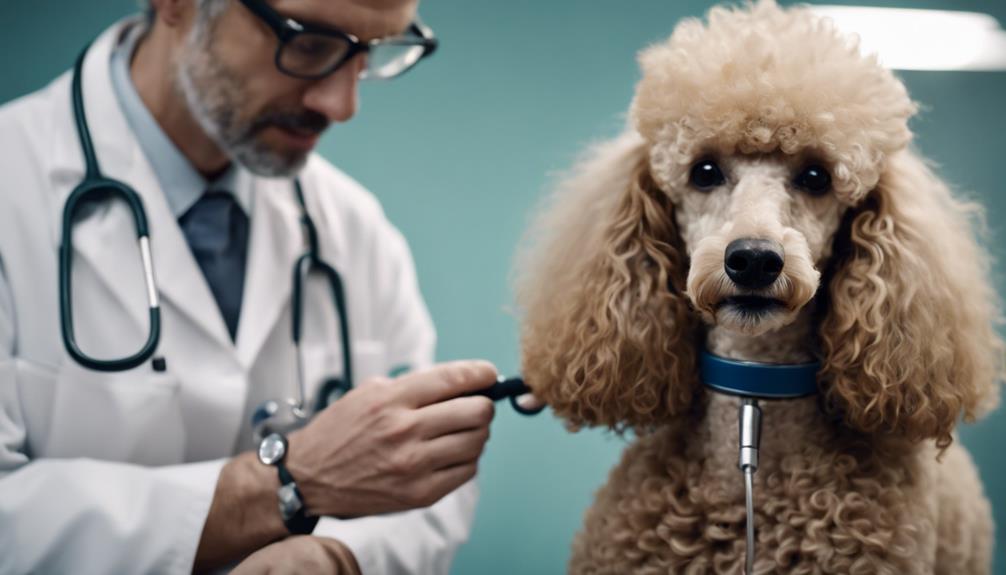As you dive into the world of poodle health screenings and checkups, it's like peeling back the layers of an onion – each layer revealing crucial insights into your furry friend's well-being. But what exactly can you expect during these vital appointments? From the tip of their nose to the wag of their tail, a comprehensive evaluation awaits your poodle. Stay tuned to unravel the key components that make up a thorough health screening, ensuring your poodle's health is in top-notch condition.
Key Takeaways
- Regular screenings detect hip dysplasia, eye issues, heart diseases, and bleeding disorders.
- Vital signs assessments aid in early health issue detection.
- Skin, coat, eye, and ear care are crucial for overall well-being.
- Nutritional guidance and tailored diets prevent common health issues in Poodles.
Essential Health Screenings for Poodles
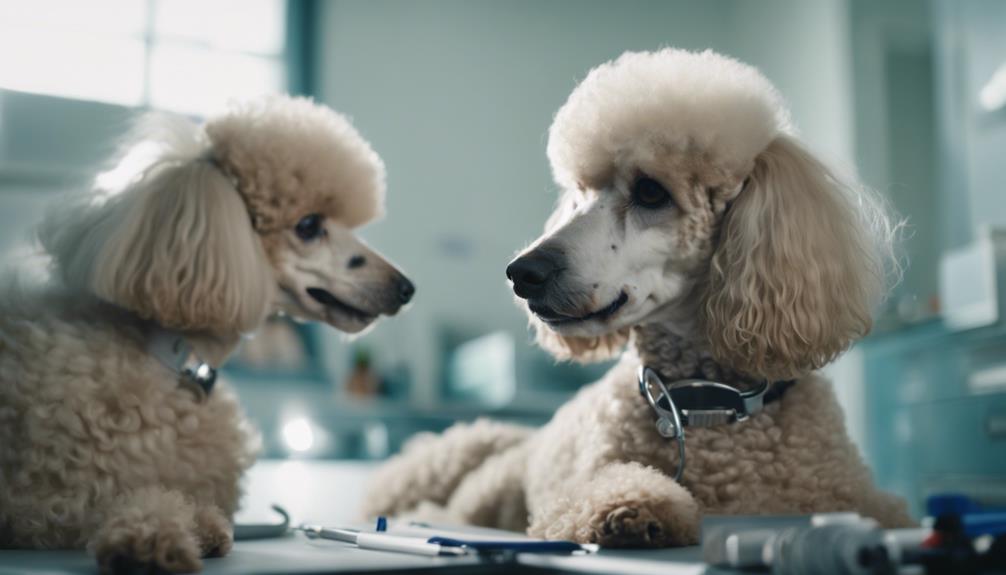
When considering the essential health screenings for Poodles, prioritizing thorough hip and elbow evaluations is crucial to detect dysplasia, a common joint issue in the breed. Poodles are prone to hip dysplasia, a condition where the hip socket doesn't fully cover the ball portion of the upper thigh bone, leading to arthritis and lameness. Regular hip evaluations can help in early detection and management of this condition, ensuring your Poodle's mobility and quality of life.
In addition to hip evaluations, eye exams are vital for Poodles to catch inherited conditions like progressive retinal atrophy, which can lead to vision impairment or blindness. Cardiac screenings are also important for Poodles to identify heart diseases such as mitral valve disease promptly. Screening for von Willebrand's disease, a blood clotting disorder, is crucial to prevent excessive bleeding during surgeries or injuries. Furthermore, routine skin and coat evaluations are essential to detect issues like allergies or dermatitis early on, promoting your Poodle's overall well-being. By staying proactive with these health screenings, you can ensure a long and healthy life for your beloved Poodle.
Regular Checkups for Poodle Maintenance
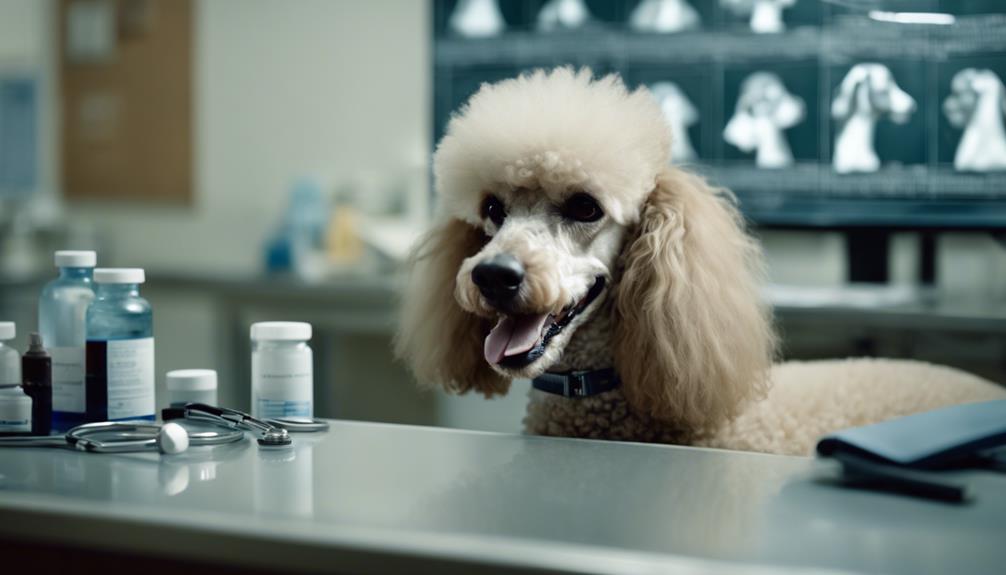
How often should you schedule regular checkups to maintain the health and well-being of your Poodle? Annual wellness checkups are crucial for keeping your Poodle healthy and happy. During these visits, your vet will conduct thorough physical examinations, assess your Poodle's weight, and check for any signs of illness. Diagnostic testing, such as bloodwork and fecal exams, may be recommended to ensure your Poodle's overall well-being. Preventive care discussions are also vital topics during these visits, covering areas like vaccines, parasite prevention, and dental care. Additionally, your vet will provide guidance on weight management tailored to your Poodle's specific needs. Remember, these visits are not just about treatment but also about prevention and education to help your Poodle live a long and healthy life.
Regular Checkups for Poodle Maintenance:
- Ensure your Poodle receives annual wellness checkups for comprehensive care.
- Prioritize preventive measures like vaccines, parasite prevention, and dental care.
- Monitor weight management closely to prevent obesity-related health issues.
- Stay proactive with diagnostic testing to catch any potential health concerns early on.
Physical Examinations for Poodle Health
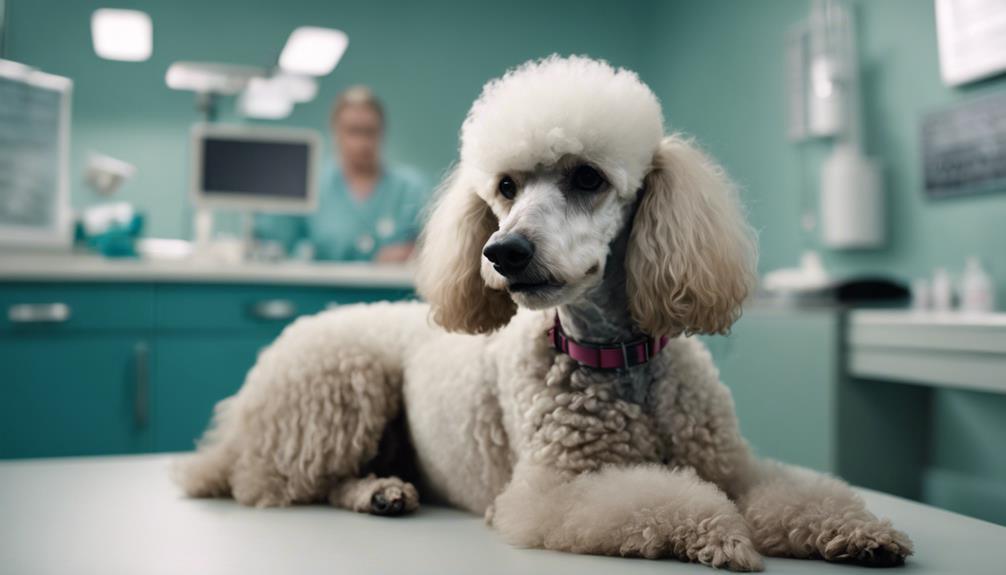
During physical examinations for your Poodle, veterinarians will assess vital signs like heart rate, breathing rate, and body temperature. They will also closely examine your Poodle's coat, skin, eyes, ears, and oral health for any abnormalities. These thorough evaluations are crucial in detecting early signs of health issues and ensuring your Poodle's well-being.
Vital Signs Assessment
Regularly monitoring vital signs, such as weight, temperature, pulse, and respiration rates, is essential for assessing the overall health of your Poodle. These assessments help veterinarians monitor your pet's health, enabling early detection of any potential issues. Here are some crucial points to consider:
- Early Detection: Regular vital signs checks aid in the early detection of health problems in your Poodle.
- Prompt Intervention: Monitoring vital signs allows for prompt intervention if any abnormalities are found.
- Health Monitoring: Changes in vital signs over time can indicate underlying health issues that require attention.
- Routine Wellness Checks: Vital signs assessments are a routine part of veterinary care to ensure the overall well-being of your beloved Poodle.
Coat and Skin
To ensure optimal health for your Poodle, conducting regular skin and coat examinations is essential. During health screenings, checking for matting, dryness, or signs of dermatitis can indicate underlying issues. Skin inspections are crucial as they can uncover allergies, hot spots, or parasitic infestations that may affect your poodle's well-being. A thorough coat assessment helps in the early detection of abnormal hair loss, dandruff, or skin infections, allowing prompt intervention. It's important to look out for lumps, bumps, or skin discoloration during these screenings to address any potential concerns promptly. Additionally, maintaining regular grooming practices can significantly contribute to the overall health and appearance of your poodle's skin and coat.
Ear and Eye
Conduct thorough examinations of your Poodle's ears and eyes to ensure their health and well-being, as these areas are critical for detecting potential issues early on. When it comes to your Poodle's ear and eye health, here's what you should know:
- Regular ear exams can help in identifying and addressing ear infections promptly.
- Eye examinations are crucial for monitoring your Poodle's eye health and catching any ocular conditions early.
- Poodles are susceptible to eye issues like cataracts and progressive retinal atrophy, making regular eye check-ups vital.
- Early detection through routine ear and eye exams can lead to preventive care measures that enhance your Poodle's overall well-being.
Blood Tests and Poodle Health
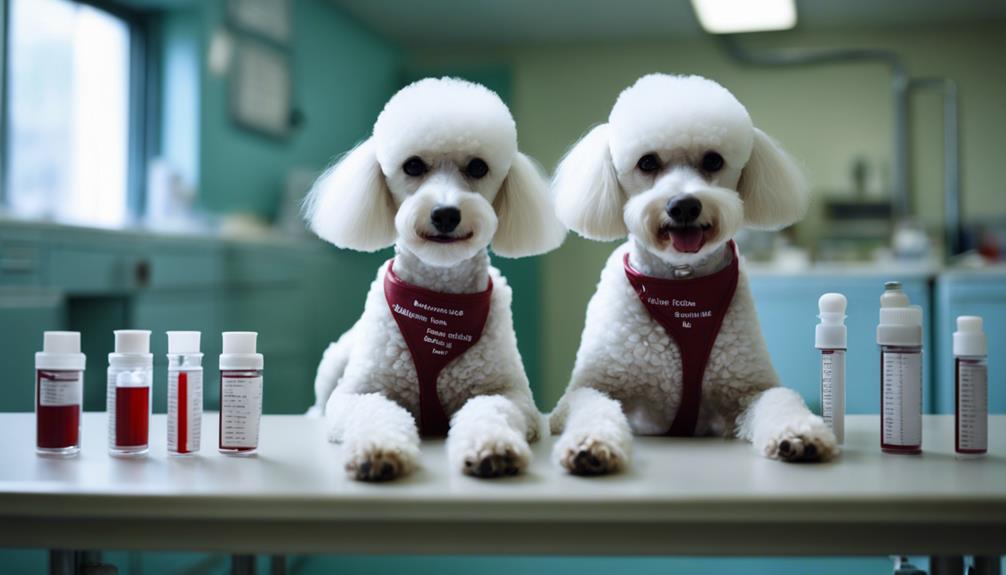
When considering the overall health of your Poodle, blood tests play a crucial role in detecting and monitoring various health issues such as hypothyroidism and genetic conditions. These tests evaluate the levels of hormones, enzymes, and blood cells, providing insights into your Poodle's well-being. Regular blood tests are vital for monitoring your Poodle's health, especially as they age and become more susceptible to certain medical conditions. Beyond genetic conditions, bloodwork can unveil underlying infections, organ function irregularities, or signs of inflammation in your beloved Poodle.
Interpreting blood test results with your veterinarian can lead to early interventions and personalized health management plans for your Poodle. By staying proactive with blood tests, you can ensure your Poodle's health is optimized and any potential issues are addressed promptly. Remember, these tests are not only about diagnosing problems but also about proactively safeguarding your Poodle's well-being for years to come.
Eye and Ear Exams for Poodles
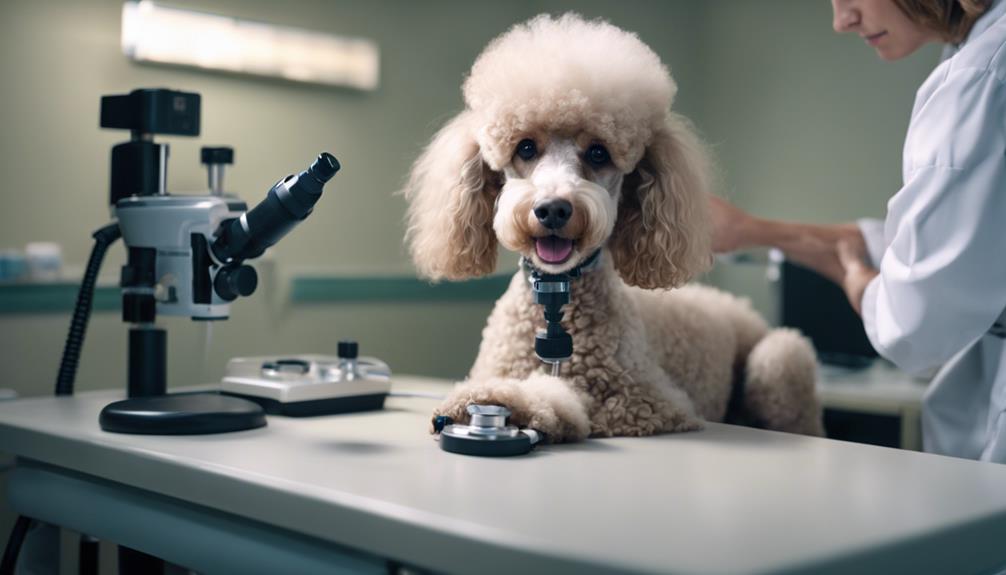
When it comes to your Poodle's health, regular eye exams are crucial to catch early signs of conditions like cataracts or glaucoma. Additionally, routine ear exams are essential to prevent common infections due to their ear structure. Checking for redness, odor, and excessive wax buildup during these exams can help maintain your Poodle's eye and ear health.
Vision Health Check
Regular eye exams are crucial for Poodles to detect conditions like cataracts, progressive retinal atrophy, and glaucoma early on. Here are a few things to consider during vision health checks for your Poodle:
- Regular Monitoring: Keep a close eye on your Poodle's vision health to catch any issues promptly.
- Early Detection is Key: Detecting eye conditions early can prevent discomfort and ensure a better quality of life.
- Consult a Veterinarian: Seek professional advice if you notice any changes in your Poodle's eyes or vision.
- Treatment Options: Understand that timely treatment for eye conditions can significantly improve your Poodle's well-being.
Ear Canal Inspection
To ensure your Poodle's optimal health and well-being, regular ear canal inspections are essential as part of their eye and ear exams. Poodles are prone to ear infections, so checking for early signs of infection is crucial. During ear exams, look for redness, swelling, discharge, odor, or excessive wax buildup in the ear canal. Poodles with too much hair in their ears may need grooming to prevent blockages that can lead to infections. Keeping the ear canals clean and dry is vital for preventing common ear issues. Regular ear exams during checkups help maintain the overall ear health of your Poodle, ensuring they stay happy and healthy.
| Aspect | Importance | Action Needed |
|---|---|---|
| Early Signs of Infection | High | Monitor for redness, swelling, discharge, odor |
| Excessive Ear Hair | Moderate | Groom regularly to prevent blockages |
| Preventing Ear Issues | High | Keep ear canals clean and dry |
| Regular Ear Exams | Essential | Schedule routine checkups for your Poodle |
Dental Care for Poodles
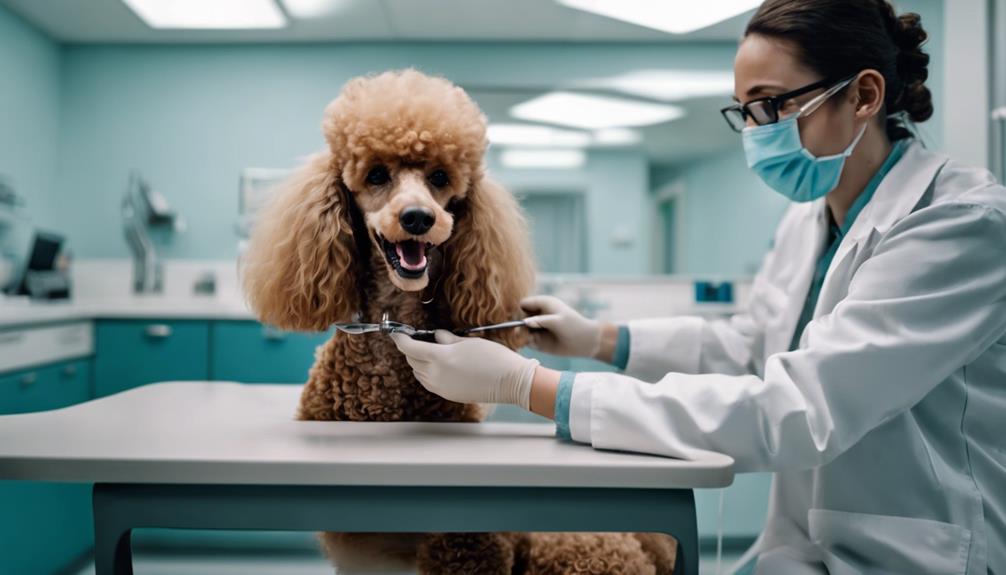
For optimal oral health in your poodle, daily brushing is essential to prevent common dental issues such as tartar buildup, gum disease, and tooth decay. Here are some key points to consider for maintaining your poodle's dental health:
- Regular Brushing: Make brushing your poodle's teeth a daily routine using a pet-specific toothbrush and toothpaste to prevent plaque buildup.
- Professional Cleanings: Consider scheduling regular professional dental cleanings to address any underlying issues and keep your poodle's teeth and gums healthy.
- Monitoring Signs: Keep an eye out for signs of dental problems such as bad breath, swollen gums, or difficulty eating, and consult your veterinarian promptly if you notice any concerning symptoms.
- Preventive Care: Alongside brushing, provide dental chews or toys designed to promote dental health, helping to reduce plaque and tartar buildup between brushings.
Nutritional Guidance for Poodle Health
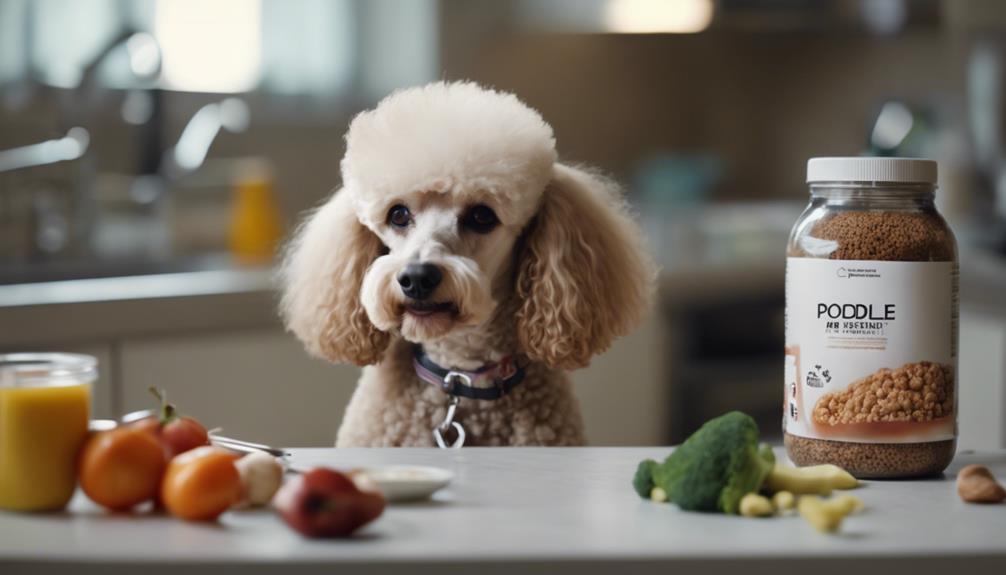
Ensuring your poodle's optimal health begins with providing a balanced diet rich in high-quality proteins, fats, vitamins, and minerals. Proper nutrition is essential for supporting their physical well-being, overall health, and pet health. Poodles have specific dietary needs depending on factors like size, age, activity level, and existing health conditions. Consulting with a veterinarian is crucial to develop a tailored nutritional plan for your furry friend. Regular wellness exams can help monitor your poodle's weight, feeding schedule, and how they respond to different foods, ensuring their dietary needs are met effectively.
Nutritional Guidance Table:
| Nutritional Guidance for Poodles | Details |
|---|---|
| Proteins | Essential for muscle development and overall health. |
| Fats | Provide energy, support skin health, and aid in nutrient absorption. |
| Vitamins and Minerals | Important for immune function, bone health, and overall wellness. |
| Tailored Diet Plan | Consult with a veterinarian for a personalized nutrition regimen. |
| Monitoring and Adjusting | Regularly assess weight, feeding habits, and food responses. |
Frequently Asked Questions
What Does a Dog Wellness Exam Include?
During a dog wellness exam, you can expect a thorough review of medical history, weight check, heart and lung assessments, skin, eyes, ears, and teeth inspections. Fecal exams for parasites and annual vaccinations are part of the routine.
What Is a Health Screening for a Dog?
During a health screening, a thorough evaluation of your dog's overall well-being is conducted. Vital signs, physical appearance, and specific body systems are assessed. These screenings aim to detect any underlying health issues early on for your dog's longevity and well-being.
What Does a Wellness Panel Test for in Dogs?
During a wellness panel for your furry friend, bloodwork analysis checks organ function, blood counts, and electrolyte levels. It also includes a urine sample, screens for genetic predispositions, evaluates nutrition, detects parasites, and reviews vaccination schedules.
How Often Should I Take My Poodle to the Vet?
You should take your Poodle to the vet at least once a year for regular vaccinations, dental care, weight management, parasite prevention, allergy testing, behavior training, and to discuss an exercise routine. These visits promote overall health and well-being.
Conclusion
So, as you can see, keeping up with regular health screenings and checkups for your Poodle is crucial for maintaining their well-being. Remember, just like you wouldn't skip your own doctor's appointments, your furry friend also deserves the same level of care and attention. By staying on top of their health needs, you are ensuring that your Poodle lives a long and happy life filled with tail wags and endless love. Keep up the good work, responsible pet parent!
